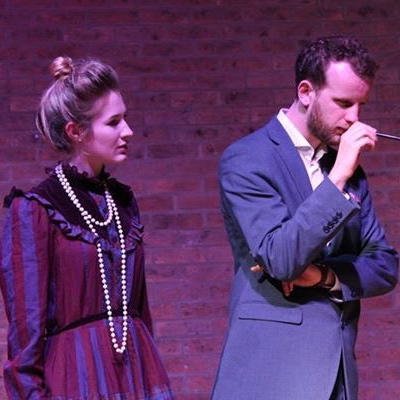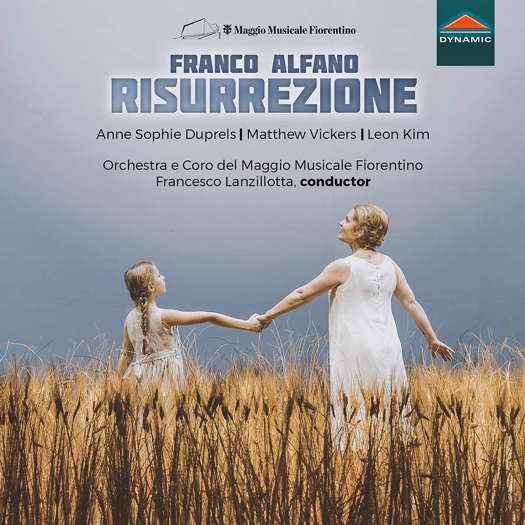- Thomas Jensen
- panpipes
- Anatoly Lvovitch Kremer
- John Hopkins
- Wilhelm Furtwängler
- The Makropoulos Affair
- Poppy Ackroyd
- Jervaulx Abbey
 SPONSORED: Ensemble. A Great Start - Freddie Meyers' new opera A Sketch of Slow Time impresses Alice McVeigh.
SPONSORED: Ensemble. A Great Start - Freddie Meyers' new opera A Sketch of Slow Time impresses Alice McVeigh.
All sponsored features >>
 DISCUSSION: What is a work? John Dante Prevedini leads a discussion about The performing artist as co-creator, including contributions from Halida Dinova, Yekaterina Lebedeva, Béla Hartmann, David Arditti and Stephen Francis Vasta.
DISCUSSION: What is a work? John Dante Prevedini leads a discussion about The performing artist as co-creator, including contributions from Halida Dinova, Yekaterina Lebedeva, Béla Hartmann, David Arditti and Stephen Francis Vasta.

A Masterpiece Re-discovered in Wexford
GIUSEPPE PENNISI listens to the opera 'Risurrezione' by Franco Alfano
'Francesco Lanzillotta conducts the orchestra of the Teatro del Maggio Musicale Fiorentino skilfully.'
This CD has a special meaning for me. It is the recording of the last opera I saw in Florence. Thereafter, the pandemic compelled me to stop my Sunday trips to opera houses. It is a live recording based on the 17 and 21 January 2020 performances in Florence, but the production had been imported from the Wexford Festival, lock, stock and barrel. Thus, the merit to rediscover this verismo masterpiece ought to go to the Festival. A full review of the performance is in the issue of this magazine dated 22 January 2020 ('Gruesome and Engrossing').
As the CD is a perfect recording of the Florence performance, in this review I want to focus on the now-almost-forgotten Franco Alfano. In fact, he is recalled only as the musician who completed Puccini's Turandot, even though the version normally played of the final scene of Turandot is that largely manipulated by Arturo Toscanini, who had a strong personal disliking for Alfano.
In short, Franco Alfano (Naples 1875-San Remo 1954) is one of the last representatives of the Italian verismo school and had his greatest success in the theatrical field, where he progressively attenuated the verismo emphasis to arrive at more meditated and complex compositions. Risurrezione, inspired by the novel of the same name by Lev Tolstoy, had its debut in 1904 in Turin and was considered his masterpiece for several years. This opera gave him international fame and was performed in Berlin, Brussels, Madrid, Paris and outside Europe; about a thousand performances within a few years.
However, Alfano's style evolved and acquired new timbres under the influence of Debussy, Rimsky-Korsakov and Strauss. This can be seen in other operas recently revived such as Cyrano and Leggenda di Sakùntala. The former became a Plácido Domingo war horse. The tenor took it all over the world; I saw and heard it at La Scala in 2008. The latter was revived in Wexford in 1982; I saw and heard a Teatro dell'Opera production in 2006. Leggenda di Sakùntala, especially, shows influences by Strauss, Debussy and Bartók.
Franco Alfano held prestigious positions. In 1918, he was the director of the Bologna Conservatory and from 1923 he was the director of the 'Giuseppe Verdi' Conservatory in Turin, a position which he held until 1939. In 1940, he became superintendent of the Teatro Massimo in Palermo, a position he held for two years. Finally, he was director between 1942 and 1947 of the National Santa Cecilia Academy in Rome and between 1947 and 1950 of the Rossini Conservatory in Pesaro. He composed twelve operas, two of which remained unfinished.
Risurrezione tells of the young aristocrat, Dimitri, who while serving on a tribunal recognises the prostitute Katerina Maslowa as the young girl he had once seduced. He rejects his former life and follows her to Siberia, trying to undo past wrongs. He obtains pardon for her and proposes to marry her, but she decides to be the wife of a political inmate, Simonson, who devotes his life to better the condition of his fellow prisoners. The music follows the verismo style: a careful orchestration (with symphonic interludes), polyphonic interventions by a large number - twenty-five - of minor characters, and lyric declamation sliding into arioso and enfolding into duets. Three duets are particularly significant, in the first, second and fourth acts.
Francesco Lanzillotta conducts the orchestra of the Teatro del Maggio Musicale Fiorentino skilfully. He pays great attention not to cover the voices with the large symphonic orchestration, and gives great attention to the third act interlude. The French Anne Sophie Dupreis as Katherina is an impressive soprano who handles an impervious role very well - especially the taxing monologue that fills almost the entire second act. Dimitri is the American tenor Matthew Vickers with a strong centre register and a very good volume. The Korean baritone Leon Kim is Simonson: he has the opera's only romanza and renders it effectively. As is often the case in verismo operas, there are about twenty other singers in minor roles.
The verismo climate can be felt from the very beginning.
Listen — Franco Alfano: Piano, che non si versi (Risurrezione Act I)
(CD1 track 1, 0:00-0:55) ℗ 2021 Dynamic Srl :
It can also be felt from the seduction duet between Dimitri and Katherina.
Listen — Franco Alfano: Ricordi quella corsa (Risurrezione Act I)
(CD1 track 7, 0:00-0:54) ℗ 2021 Dynamic Srl :
Anne Sophie Dupreis is very impressive in the second act.
Listen — Franco Alfano: Dopo quel giorno dunque (Risurrezione Act II)
(CD1 track 10, 0:00-0:58) ℗ 2021 Dynamic Srl :
In the third act, there is a very good duet between the two protagonists.
Listen — Franco Alfano: Come mi guardi! (Risurrezione Act III)
(CD2 track 8, 2:29-3:10) ℗ 2021 Dynamic Srl :
In the fourth act, I flag the introduction and the finale.
Listen — Franco Alfano: Preludio (Risurrezione Act IV)
(CD2 track 14, 1:59-2:42) ℗ 2021 Dynamic Srl :
Listen — Franco Alfano: E sii felice (Risurrezione Act IV)
(CD2 track 19, 7:35-8:35) ℗ 2021 Dynamic Srl :
In short, this is a rediscovered masterpiece.
Copyright © 14 September 2021
Giuseppe Pennisi,
Rome, Italy

CD INFORMATION - FRANCO ALFANO: RISURREZIONE


